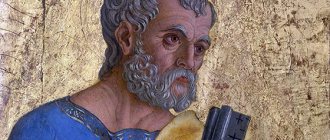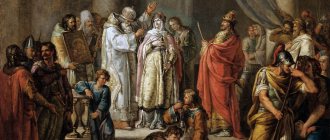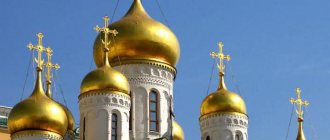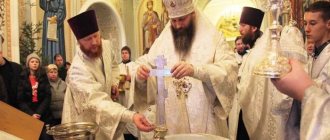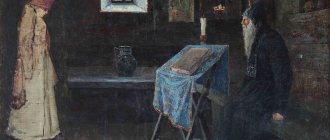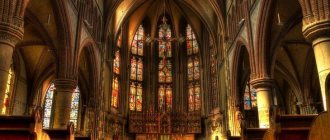“Holy Rus', Orthodox, heroic, mother land of Holy Russia,” Vladimir Dal wrote down this saying during his travels. Holiness is the imperishable ideal of the Russian land. No matter what moral abyss a person falls into, he is always aware of his fall and knows his path to return to God.
What is Holy Rus'
Why Rus' is holy - this topic is very fertile for study, because no other state in the world is called holy. Christianity arose in the 1st century AD. e. in Palestine, and it came to us only in the 9th century, but only our, originally pagan state began to be called holy.
Holiness is the property of the Russian people to sacrifice themselves in the name of faith in goodness and justice. After receiving Baptism, the Russians united into a strong state and were able to defeat numerous enemies. An example of Orthodox faith and sacrifice is the victory of the Russian people in the Great Patriotic War, which began on the Day of All Russian Saints in 1941.
Origin of the phrase
First, the phrase “blessed prince” appeared, then foreign travelers began to call the princes - his lordship the Russian prince. These two words: light and Russian have firmly taken root in colloquial speech. Prince Vladimir the Baptist was called the spiritual father and “Saint Vladimir.”
The phrase Holy Rus' was first heard in the church anthem of Russia before the start of the February Revolution. This happened when writing a text for the service to the holy martyr Patriarch of Moscow and All Rus' Hermogenes. The stichera is sung in Church Slavonic. The words in it are simple, but wise, the very essence is stated: what the Russian Land is intended for, what a person needs to do in earthly life, how to behave, how to take care. Presumably, this stichera was composed by the sisters of one of the Kyiv monasteries, where nun Anastasia was the abbess.
HYMN OF HOLY Rus'
Russian Land, Holy City, Decorate your home, Glorify the divine Great Host of Saints in it.
Russian Church, Show off, rejoice, Behold, your children stand before the Lord’s Throne in glory, rejoicing.
Cathedral of Russian Saints, Divine Host, Pray to the Lord for your earthly Fatherland and for those who honor you with love.
New house of the Euphrates, Chosen Destiny, Holy Rus', keep the Orthodox Faith, In it you will be affirmed.
Meaning of the concept
The meaning of the concept “holy” in paganism was understood as an increase in flowering and fruiting, and in Christianity it meant an increase in spiritual flowering. The foundations of the spiritual life of the laity were faith and repentance, belief in a living, saving God. Thanks to the successful activities of the clergy, a stable concept of Holy Rus' was formed.
First information about Christians
The first evidence of a fairly massive conversion of the Slavs dates back to the middle of the 9th century. Then they especially often attacked the Greek colonies of the Northern Black Sea region, and finally, around 860 or 866, they reached Constantinople. This attack, led by the Varangian princes Askold and Dir , who then ruled Kiev, is recorded in the Byzantine chronicles. According to them:
- the city was practically left without protection, Slavic troops were already rampaging through the surrounding area;
- then Patriarch Photius immersed a shrine - the Robe of the Most Holy Theotokos - into the waters of the Bosphorus Strait; a terrible storm began, completely destroying the enemy ships;
- the result of the defeat was unexpected: enlightened by the miracle, the princes and their squads... asked for Baptism; Moreover, they asked to send a bishop and priests to Rus'.
Askold and Dir in Constantinople (chronicle miniature)
In 867, in his District Message to the eastern episcopal thrones, Patriarch Photius of Constantinople, announcing the baptism of the Bulgarians, reported quite interesting information:
“For not only this people (Bulgarians - author) changed their former wickedness to faith in Christ, but even for many, many times famous and leaving everyone behind in ferocity and bloodshed, that same so-called people of Ros - those who, having enslaved those who lived around them and therefore became overly proud, they raised their hands against the Roman Empire itself!
But now, however, they too have changed the pagan and godless faith in which they lived before, to the pure and genuine religion of Christians, themselves with love! putting us in the position of subjects and hosts instead of the recent robbery and great daring against us. And at the same time, their passionate desire and zeal for faith was so inflamed (Paul again exclaims: “Blessed is God” forever!) that they received a bishop and a shepherd and with great zeal and diligence they meet Christian rites.”
Who is the very first Christian in Rus'
With a high probability - one of the princes, probably Askold. His co-ruler Dir, their squad, can also be called the first Christians This first Baptism of Rus' (866-867) is called by Byzantine sources “Photiev”, after the Primate of Constantinople under whom it took place. However, in 882, the Novgorod prince Oleg, a pagan Scandinavian, captured Kyiv, killing Askold and Dir.
Interesting fact
The fact that Askold and Dir adopted
Christianity is evidenced by the fact that over the grave of Askold in the 11th century, the pious boyar Olma erected the Church of St. Nicholas.
In what year did Princess Olga convert to Christianity?
Subsequently, Christianity remained a fairly noticeable force: there were many believers among Prince Igor’s squad, and he himself favored Christianity. In 945, the prince was killed by the Drevlyan Slavs. His wife, Princess Olga , brutally dealt with them, as the pagan customs that reigned then ordered.
Olga enters the Church of St. Sophia, Constantinople. Artist I. Mashkov
Little is known about what spiritual change occurred subsequently. Was it her grief over her husband that prompted her to convert? Did the Christians of Kyiv influence? In any case, 12 years after the murder of Igor, in 957, she accepted the faith in Constantinople. But this event also did not become the “starting point” of mass Baptism:
- the princess's son, Svyatoslav, remained a zealous pagan;
- an attempt to form a diocese in Rus' ended in a riot; in the last years of her life, Olga could only try to give a Christian education to her grandchildren.
History of the term
The history of this term originated in oral folk epic. In fairy tales and epics, legends and poems, heroes and heroes were called nothing less than Holy Russians, since they defended the Holy Russian land. After the fall of Byzantium, the Russian land began to be presented as the guardian of the true Christian faith.
We recommend literature
You can read about Epiphany and the first centuries of Christianity in Rus':
- from the classics of historical science; this is V.O. Klyuchevsky, S.F. Platonov, Met. Macarius (Bulgakov), others;
- from modern historians: I.N. Danilevsky, V. Petrukhin; For a brief acquaintance with the history of Baptism, the latest developments of scientists in recent years, we can recommend the course of lectures “History of the Russian Church” by Doctor of Church History V.Ya. Petrushko.
In 1988, the second millennium of Christianity on our land. Is Rus' holy now? Does the legacy of the ancestors remain? Sometimes it seems - not at all. But churches still await believers, and from the holy images look out the faces of those who built the faith here, and now pray for us at the throne of God.
Natalia Sazonova
How Rus' became Holy
The founders of Russian holiness include Sergius of Radonezh. He was the pioneer of the konoviya (monastic hostel) with a very strict charter. He carried out his obedience sternly: he spoke little, prayed tirelessly, and if he spoke, it was only about business.
An aura of respect and holiness was created around the monasteries. Each monastery was a church and a hospital, a school and a library. It was Father Sergius who called for the unity of all believers not by nationality, but by spirituality. People began to believe that Orthodox Rus' would live forever, helping itself, its holiness would be indestructible.
The monastery is a type of organization of people that appeared in Rus' with the adoption of Christianity.
Monasticism appears in Rus' immediately after Epiphany - these were Greek monks who arrived from Byzantium. And from the beginning of the 11th century. St. Anthony founded the Assumption Pechersk Monastery near Kiev - the first established by Russian ascetics, and, of course, the most influential.
The relics of St. Agapit of Pechersk in the Near Caves
Why? The answer is given by the Kiev-Pechersk Patericon, which describes the lives of ascetics. The unpaid doctor Agapit , the great icon painter Alypius , the wise abbot Theodosius , the holy Prince Nikola , who left behind fame and wealth, the former warrior of the deceased Prince Boris Moses Ugrin, dozens of other ascetics - what is striking is not only their holiness, but also the fact that they are all contemporaries! It is not surprising that in Rus' an idea is being formed about the monastic ideal of life, that it is good for the family where there is a monk...
Image of Holy Rus'
The image of the holiness of the Russian land with its more than 1000-year history consisted of three pillars:
- Orthodoxy.
- Statehood.
- Nationality.
Orthodoxy teaches people faith in goodness, love, mercy and patience towards others. The most important task today is to return to the Russian people the understanding that without Faith and Motherland, a full life for the individual and family, society and state is impossible.
The Image itself is:
- Cathedral of Russian Saints;
- miraculous icons and other Russian shrines;
- the special grace-filled quality of the Russian people, which made it a stronghold of the Christian faith;
- service to Orthodox ideals and heartfelt adherence to Christ’s commandments;
- the ideal and at the same time the earthly reality of Russia, expressed in the spiritual exploits of Russian saints.
In culture
The history of Russian culture can begin with the Baptism of Rus', because until that moment there was no predecessor - culture on its own territory. With the advent of Christianity, a religion arose that introduced Rus' to a highly developed civilization and the history of European countries. Suddenly, from a pagan country at the end of the world, a new power with a world culture and religion appears.
All over the country they began to build beautiful cathedrals - Sophia, which still amaze with their beauty and splendor. Parochial schools and hospitals were opened at the churches. The ministers of the Orthodox Church, by their example, taught the people hard work, abstinence, kindness and mercy. Many of them were canonized and are revered to this day.
Starting from the 17th century, the concept of the holiness of Rus' became part of folk culture. From the point of view of popular understanding, the Russian state unites with the Universe and the church, it turns out that Holy Rus' exists wherever there is the Orthodox faith.
In art
Old Russian painting appears during the heyday of Kievan Rus under princes Vladimir and Yaroslav the Wise. Russian masters managed to create their own national art based on the Byzantine school. When painting cathedrals and temples, they used mosaics and frescoes.
Another bright page in art is icon painting. The image of the Holy Mother of God was depicted in more than three hundred iconographic scenes. The art of miniature handwritten books was also mastered. The creation of writing is associated with the names of the brothers Cyril and Methodius, who not only created the Slavic alphabet, but also translated the books of the Holy Scriptures into it from ancient Greek.
Many artists of our time continue to paint images of holy Russian people, to depict some significant moments from the history of the formation of our Sacred Land. With his art, making it clear that the Russian people, living in a country with a rich history, are endowed with self-awareness, that only through beauty, closely connected with art, does a person come to the knowledge of God.
Many great composers wrote church music: Glinka, Borodin, Mussorgsky, Tchaikovsky, Rachmaninov and Rimsky-Korsakov. The liturgies of Tchaikovsky and Rachmaninov were intended for worship. Orthodox traditions were reflected in Russian painting, the work of the greatest artists: Vasnetsov, Nesterov, Kramskoy. Pay attention to the painting “Holy Rus'” by Mikhail Nesterov.
In literature
The image of the holiness of the Russian land and the theme of religiosity have always been traced in the works of writers, poets and composers, even in the post-revolutionary period, for more than seventy years. The opportunity to access the values of Orthodox spirituality was provided by the works of Pushkin, Dostoevsky, Gogol, Chekhov, Lermontov and many other authors of that time.
The works of Russian writers of the 19th century are rightfully considered treasures of world literature. Even the great Alexander Pushkin, after a period of doubt and renunciation of faith, wrote beautiful poems about Christianity. The religious theme of the sacred Russian land has always occupied an important place in Russian literature and philosophy.
This video presents a discussion by professor of philology Alexander Ospovat about the meaning of the term.
Who and when established a holiday in honor of the adoption of Christianity in Rus'
Neither the church nor the civil calendar had such a memorable date until May 31, 2010 .
Then the President of the country D.A. Medvedev signed a decree on the celebration of the Day of the Baptism of Rus' “as a memorial date of an important historical event that had a significant impact on the social, spiritual and cultural development of the peoples of Russia and on the strengthening of Russian statehood.”
July 28, the day of the holiday - the memory of the prince who baptized the Russians - Vladimir Svyatoslavich.

